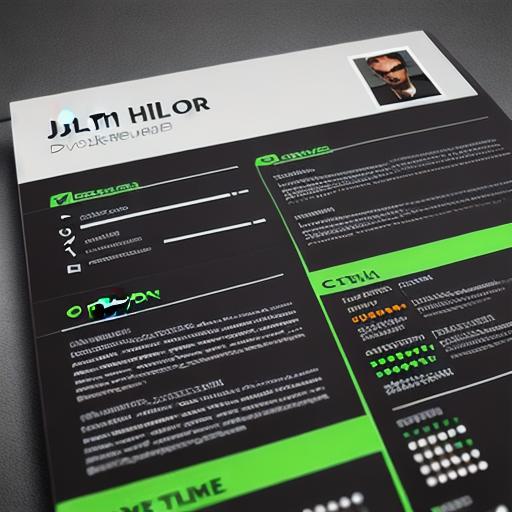Creating a resume is an essential part of the job search process for anyone looking to work in the gaming industry. A well-crafted resume can make all the difference in securing your dream job. However, creating an effective resume that stands out from the crowd can be challenging for many aspiring game developers. In this article, we will provide you with some expert tips and examples on how to write a highly viral and engaging game dev resume that showcases your skills and experience.

Understanding Your Target Audience:
The first step in writing a successful game dev resume is understanding your target audience. Who are you applying for? What kind of job do you want? What skills and experiences are required for the position? Once you have a clear idea of what you’re looking for, you can tailor your resume to better suit the needs of your target audience. For example, if you’re applying for a programming job in the gaming industry, you need to understand the specific skills and experience that employers are looking for.
Creating an Attention-Grabbing Headline:
The headline is the first thing that potential employers will see when they scan through your resume. To make it stand out, use a clear and concise headline that highlights your most relevant skills and experiences. For example, "Experienced Game Developer with Strong Leadership Skills" or "Creative Problem Solver and Skilled Programmer." Your headline should be attention-grabbing and convey the essence of what you bring to the table as a game developer.
Including Relevant Work Experience:
Work experience is one of the most important sections of a game dev resume. Be sure to include any previous job titles, responsibilities, and accomplishments. Use specific examples to demonstrate how your skills have helped you succeed in your past roles. For example, instead of just saying "Responsible for developing and maintaining games," include details such as "Developed and released successful mobile game ‘X’ with over 1 million downloads." This will show that you have practical experience in game development and can deliver results.
Using Case Studies:
Case studies are a great way to showcase your skills and experience in action. Include examples of projects you have worked on, including any challenges you faced and how you overcame them. For example, if you worked on a game that required complex programming, include details about the challenges you encountered and how you used your technical expertise to solve them. This will demonstrate your problem-solving skills and ability to work under pressure.
Highlighting Your Skills:
Skills are an essential part of a game dev resume. Be sure to list any relevant skills, such as programming languages, game engines, and design tools. Use bullet points to make it easy for potential employers to quickly scan through your skills section. Also, include examples of how you have used these skills in the past to demonstrate your proficiency. For example, if you are skilled in Python programming, provide details about projects where you used this skill to develop a game or application.
Incorporating Personal Projects:
Personal projects are a great way to showcase your creativity and passion for game development. Include any games or apps you have developed on your own or as part of a team. Be sure to highlight any unique features or challenges you faced while working on these projects. This will demonstrate your ability to work independently and think outside the box. Personal projects are also an excellent way to showcase your skills and experience in a creative way.
Using Comparisons:
Comparing yourself to other candidates can be an effective way to make your resume stand out. Use comparisons to highlight your strengths and show how you are better suited for the position than others. For example, if you are applying for a programming job, compare your experience with that of other candidates to demonstrate why you are the best fit for the role. This will help potential employers understand what makes you unique and why they should hire you over other candidates.
FAQs:
What are some common mistakes to avoid when writing a game dev resume?
Some common mistakes include using overly complex language, including unnecessary information, and failing to tailor the resume to the specific job requirements. It’s important to keep it concise and focused on your most relevant skills and experiences. Also, be sure to proofread your resume for spelling and grammar errors before submitting it.
Conclusion:
Writing a highly viral and engaging game dev resume can be challenging, but with the right tips and examples, you can create a document that will make a lasting impression on potential employers. Remember to understand your target audience, include relevant work experience, use case studies, highlight your skills, incorporate personal projects, use comparisons, and keep it concise and focused. By following these tips, you can write a game dev resume that will help you land your dream job in the gaming industry.
